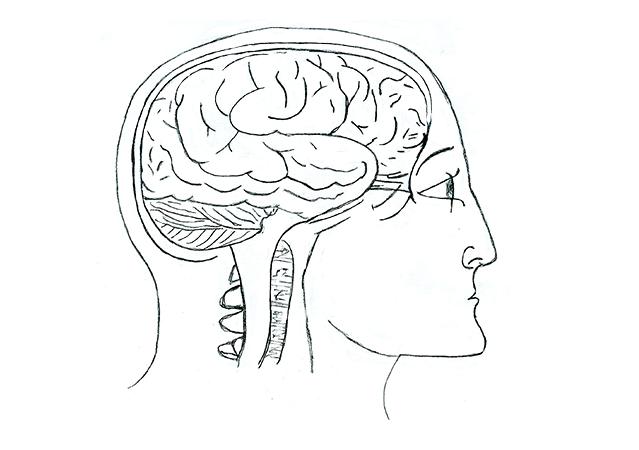Mind Games
Athletes and coaches utilize psychological strategies to gain a competitive edge.
Athletes spend countless hours training for competition, but their success may ultimately come down to their mindset. Whether it be visualization or meditation, most athletes have one personal mental trick to gain a competitive edge.
For Hannah Pierson, senior, visualization plays a key role in her success on the cross country and track courses.
“The night before a race, I’ll write down what my race plan is going to be, where I’m going to make certain moves and where I’m really going to push,” Pierson said.
Pierson said it’s necessary for the whole team to have a common goal in order to motivate one another.
“Creating that sports culture where everyone’s on the same page and is committed really helps with the mental side of stuff,” Pierson said. “Knowing you have your teammates with you and they’re going to help you get through it.”
For Will Diedrich, junior, improvement is found through practicing a positive mindset, on and off the soccer field.
“During practice, if you can push yourself then you’ll want it more,” Diedrich said. “If you practice a positive mindset during practice, it’ll be easier to maintain during a game.”
Diedrich said this past season it was difficult to be motivated due to the losses the team experienced.
“At times, it was harder to want to be there,” Diedrich said. “If we would have just stayed positive and pushed ourselves harder after each loss, I think we could have been more prepared for the next game.”
Diedrich said he’s also motivated by his coaches, including Head Coach Chris Kenny.
“I think for Kenny, he’s sacrificed so much time for us and I feel like we owe it to him,” Diedrich said.
Coaches also are instrumental to an athlete’s performance and can either build them up or break them down on a daily basis: mentally or physically.
Coach Kenny said those who have the best success athletically are the people who have the mindset of being determined and perceptive of their strengths, as well as their weaknesses.
“The tendency toward high school athletes is ‘oh, I’m pretty good, I don’t need to change much’.” Kenny said. “If you want to continue to evolve, in anything, continue to look at things differently and how you can get better.”
Kenny said, as a coach, he tries to keep identifying objectives for individuals to get better and collectively, how the team can improve to keep setting those short term and long term goals. For him, trust is one of the most important aspects.
“If you don’t trust me, then suddenly the athlete says ‘they’re wrong, I’m right so I don’t need to do that’,” Kenny said. “You need to strive for that bond and ideally, we’re in this together.”
Dr. Erin Shannon, sports psychologist, said the best coaches are able to identify and modify their techniques to each individual player and then to apply them to the group or team. Each team morphs its own personality
Personality and performance are intricately woven, Dr. Shannon said, because personality is intrinsically tied to your mindset and your personality is going to impact how you get to your optimal performance level.
It’s important for coaches to see how personality impacts performance under different situations because certain personalities perform better under stress, while others will crumble under stress.
“You’ve got a really multidimensional relationship that a player has with his coach,” Dr. Shannon said. “Sports run on emotions so these players go through emotions on and off the field, and sometimes coaches are the only people kids can lean on, depending on their social situation outside of school.”
In the past decades, the fitness industry has advanced towards training the mind. However, there is still not enough time invested in mental gain as well as physical gain.
“We’ve pushed everything the body can do physically beyond what we could imagine, and then some. The final frontier is mentally,” Dr. Shannon said. “If you can tap into the power of your mind, you could have an edge over anyone in your field.”
Coaches also need to be educated in mechanics and have some knowledge of body dynamics and the most current medical knowledge.
Coach Missy Burger said the cross country and track coaching staff try to stay on top of research to find new techniques to try with the program. They also value individual conferences with athletes and integrating teamsmanship and leadership.
Burger said psychology is an integral aspect to any sports performance for any person.
“I don’t think necessarily it’s a certain personality,” Burger said. “I think it’s finding the psychological aspect that works the best for you and helps you improve your race or meet or competition.”
Changing a mindset doesn’t happen right away, and it requires an athlete to practice at it.
“Any kind of sport or activity, you get what you give,” Burger said. “At the same time, we want this to be a positive experience for our sport so we expect all people to have positive mindsets coming on.”
Your donation will support the student journalists of Marquette High School. Your contribution will allow us to purchase equipment and cover our annual website hosting costs. You may become a PATRON by making a donation at one of these levels: White/$30, Green/$50, Blue/$100. Patron names will be published in the print newsmagazine, on the website and once per quarter on our social media accounts.








